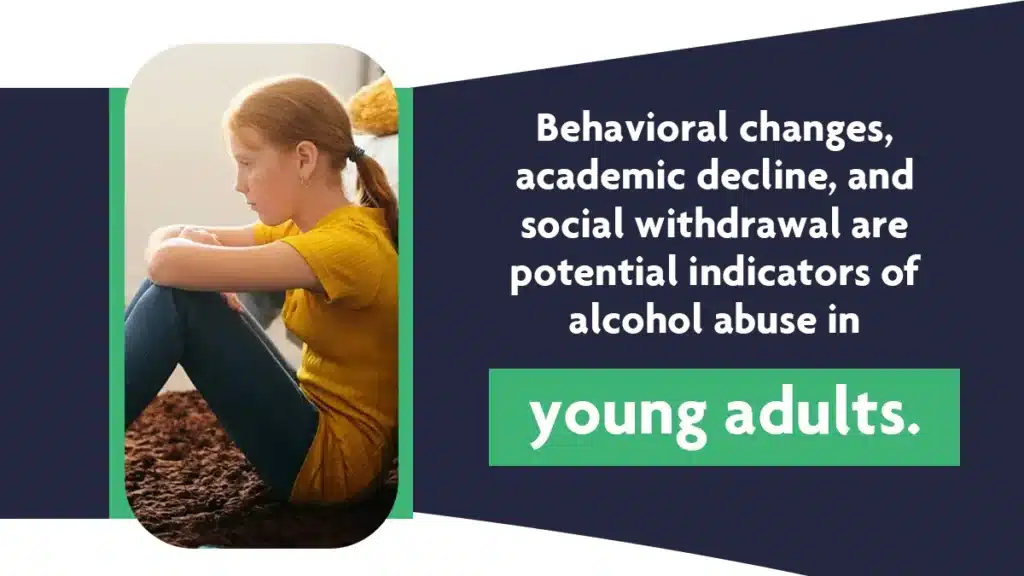Teen alcoholism treatment is a critical and sensitive endeavor aimed at addressing the unique challenges faced by adolescents struggling with alcohol dependence.
From evidence-based therapies to support systems fostering recovery, the following exploration can raise awareness, empower parents and educators, and provide valuable insights into the recovery process for young adults grappling with this challenging issue.
Key Takeaways
Creating a supportive and non-judgmental environment can significantly impact a teenager’s choices regarding alcohol consumption. Here’s what you need to know:
- Teen alcoholism involves the unhealthy and compulsive consumption of alcohol by adolescents.
- Behavioral changes, academic decline, and social withdrawal are potential indicators of alcohol abuse in young adults.
- Addressing teen alcoholism requires combining education, communication, and support systems to curb early and excessive alcohol use among teenagers.
Contact our teen treatment center at (845) 479-6888 for more information and teen-personalized drug assistance services to foster healthier lives.
What is Teen Alcoholism?
Teen alcoholism refers to the condition where individuals between the ages of 12 and 20 engage in problematic and excessive alcohol consumption. This pattern of alcohol abuse can have severe physical, emotional, and social consequences for teenagers.
Adolescents are particularly vulnerable to the negative effects of alcohol due to ongoing brain development, which can be hindered by alcohol exposure. Teen alcoholism can lead to academic problems, impaired judgment, risky behaviors, and increased susceptibility to addiction later in life.
Signs of Teen Alcoholism
Signs of teen alcoholism may include:
- Sudden changes in social circles and withdrawal from friends
- Decline in academic performance and school attendance
- Frequent mood swings and irritability
- Neglect of personal hygiene and appearance
- Unexplained financial difficulties or stealing money
- Secretive behavior and lying about whereabouts
- Physical signs like slurred speech and unsteady movements
- Loss of interest in hobbies and extracurricular activities
- Increased tolerance and need for larger amounts of alcohol
- Episodes of binge drinking and memory lapses
Common Triggers of Teenage Alcoholism
Teenage alcoholism, or alcohol use disorder (AUD) in adolescents, can be influenced by a combination of biological, psychological, and environmental factors. It’s important to note that each individual’s situation is unique, and not every teenager with these risk factors will develop alcohol-related problems.
Some common causes and risk factors include:
Social Pressures and Teenage Drinking: One significant cause of teenage alcoholism is the immense pressure teenagers face to conform to societal norms. Peer influence plays a pivotal role, as adolescents often succumb to the desire to fit in and be accepted by their peers.
The pervasive culture of alcohol consumption in social settings can make it challenging for young people to resist the temptation to drink.
Emotional Stress and Self-Medication: Emotional stress is another major contributor to teenage drinking problems. Adolescents grappling with the challenges of adolescence may turn to alcohol as a form of self-medication to cope with emotional turmoil.
Factors such as academic pressure, peer pressure, family issues, and personal struggles can drive teenagers to seek solace in alcohol, creating a dangerous cycle of dependence.
Genetics and Alcohol Use: Genetic predispositions also play a role in the development of teenage alcoholism. Children with a family history of alcohol use disorders may be more susceptible to developing problematic drinking habits themselves.
Genetic factors can influence a teen’s tolerance to alcohol and drug use and the likelihood of developing an addiction, making it essential to consider familial influences when addressing teenage alcoholism.
Consequences of Teen Alcoholism
Teen alcoholism poses severe consequences, impacting various facets of a young individual’s life.
Let’s have a look at the impact of alcoholism on teenagers’ lives.
Health Risks of Teenage Drinking: One of the foremost concerns surrounding teen years of alcoholism is its detrimental impact on physical and mental health. Adolescents’ developing brains are particularly vulnerable to the toxic effects of alcohol, leading to impaired cognitive function, memory loss, and an increased risk of addiction later in life.
Furthermore, alcohol abuse can result in liver damage, compromised immune systems, and heightened susceptibility to accidents and injuries.
Academic and Social Impact: Teen alcoholism significantly hampers academic performance and social development. Excessive drinking often leads to poor concentration, decreased motivation, and impaired judgment, all of which contribute to declining grades and increased absenteeism.
Socially, it can strain relationships with peers and family as erratic behavior and mood swings become more prevalent. The social consequences extend beyond personal relationships, affecting participation in extracurricular activities and hindering the development of essential life skills.
Legal Consequences: Engaging in underage drinking exposes children to legal ramifications. Possession, consumption, or attempting to purchase alcohol under the legal age can result in fines, community service, or even juvenile detention.
These legal consequences impact the individual directly and have long-lasting implications on their future educational and employment opportunities. Understanding and addressing these consequences is crucial in fostering awareness and preventing the devastating effects of teen alcoholism.

Treatment for Teen Alcoholism
Teen alcohol abuse is a serious health concern that demands a multifaceted approach to effective treatment. Several options are available to address the unique challenges faced by adolescents struggling with alcohol addiction.
Residential Rehabilitation Centers: Residential treatment centers provide a structured and supportive environment where teens can receive intensive treatment for alcoholism. These treatment facilities offer round-the-clock care, counseling, and educational programs.
The immersive nature of residential centers helps teens break free from the environmental triggers that contribute to their drug abuse. Therapeutic activities, group sessions, and individual counseling play pivotal roles in addressing the psychological and emotional aspects of addiction.
Counseling and Therapy: Counseling and therapy are fundamental components of teen mental illness. Individual counseling helps teens explore the root causes of their alcohol abuse and develop coping strategies. Family therapy can involve parents and siblings in recovery, fostering a supportive home environment.
Group therapy sessions allow teens to share experiences, build community, and learn from one another.
Medically Assisted Treatment: In some cases, medically assisted treatment may be recommended by doctors, involving medications that help manage withdrawal symptoms and cravings. This approach is often combined with counseling to address the physical and psychological aspects of mental health disorders.
Medical professionals closely monitor teens undergoing this treatment to ensure its safety and efficacy.
Family’s Role in Recovery
Family plays a crucial role in supporting a teenager’s recovery from substance use disorders. The family unit is a primary source of stability and emotional support during challenging times. To foster recovery, families need to educate themselves about addiction, attending support groups and therapy sessions to understand better the complexities involved.
A united front is essential, creating an environment where the teenager feels loved, understood, and supported. Establishing boundaries, expectations, and consequences helps maintain a structure that aids recovery.
Understanding and Supporting Teens During Recovery
Understanding a teen’s challenges during recovery is paramount for providing effective support. Acknowledging the struggles without judgment fosters an atmosphere of trust. Recognizing that recovery is a continuous process marked by successes and setbacks is crucial.
Offering encouragement and celebrating milestones, no matter how small, contributes positively to the teenager’s self-esteem. Supporting their engagement in positive activities and encouraging them to build a sober social network are essential components of sustained recovery.
Communication and Establishing Healthy Behaviors
Open and honest communication is the cornerstone of a healthy recovery process. Families must create a safe space for teens to express their feelings, concerns, and successes. Active listening is imperative, as it builds trust and reinforces the idea that their voice matters.
Establishing healthy behaviors involves setting realistic goals and expectations, emphasizing the importance of self-care and coping mechanisms. Encouraging the development of new, constructive habits replaces old destructive patterns.
Family members must model positive behaviors and engage in activities that promote overall well-being. Constructive feedback and positive reinforcement contribute to the teenager’s sense of accomplishment and motivation.Ultimately, a family’s commitment to understanding, supporting, and effectively communicating enhances a teenager’s chances of successful recovery from substance use.
Let Us Be Your Teen’s Partner in Recovery
We understand that navigating your teen’s struggle with alcoholism can be challenging. But remember, you’re never alone on this journey. Our medical professionals specialize in holistic healing, guiding your teen toward a healthier, happier future. The journey to recovery starts with your decision. Together, we can pave the way for a brighter tomorrow. Call us at (845) 539-0834 for more information.

Frequently Asked Questions (FAQ)
What is the most common defense mechanism used by alcoholics?
Denial is a prevalent defense mechanism among alcoholics, often shielding them from acknowledging the severity of their drinking habits. This psychological coping strategy involves minimizing the impact of alcohol on their lives, making it challenging for individuals to recognize the need for intervention.
Breaking through denial is a crucial step in facilitating recovery and fostering a more realistic understanding of the consequences of alcohol abuse.
What is the first stage in the treatment of alcoholism?
The first stage in the treatment of alcoholism is typically detoxification, where individuals undergo a medically supervised process to rid their bodies of alcohol. This phase addresses withdrawal symptoms and helps stabilize the person physically.
Following detox, comprehensive treatment plans, including counseling and support, are essential to address the psychological and behavioral aspects of alcohol dependence, fostering long-term recovery.
What are the first signs of teen alcoholism that parents or guardians should look out for?
Parents should be alert to signs such as sudden changes in behavior, declining academic performance, increased secrecy, altered social circles, and mood swings in teens. Physical indicators like bloodshot eyes or unusual smells on breath may also be red flags.
Being vigilant and maintaining open communication is crucial for early detection and intervention to address potential issues related to teen alcoholism.
Unlock Resilience: Residential Addiction Treatment for Teens
Discover the path to freedom from alcoholism for your teen with our specialized and compassionate addiction treatment services. Our residential treatment program creates a nurturing haven, empowering teens to overcome addiction cycles.
Moreover, our art and music therapy, recreational activities, and educational workshops equip teenagers with coping strategies against alcohol influences, providing a comprehensive recovery experience. Your teen is not alone in their journey to recovery. Call us at (845) 479-6888 now and pave the way for a healthier and happier future.


